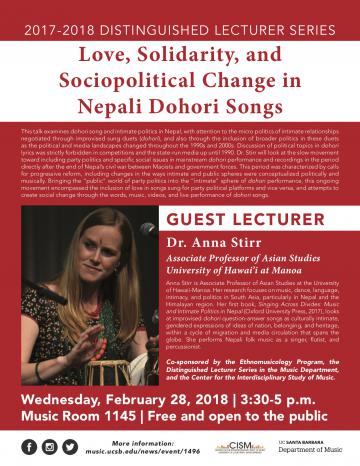Event Date:
Wednesday, February 28, 2018 - 3:30pm to 5:00pm
Event Location:
- Music 1145
February 28th
3:30 - 5:00 PM
Music 1145
This talk examines dohori song and intimate politics in Nepal, with attention to the micro politics of intimate relationships negotiated through improvised sung duets (dohori), and also through the inclusion of broader politics in these duets as the political and media landscapes changed throughout the 1990s and 2000s. Discussion of political topics in dohori lyrics was strictly forbidden in competitions and the state-run media up until 1990. I look at the slow movement toward including party politics and specific social issues in mainstream dohori performance and recordings in the period directly after the end of Nepal's civil war between Maoists and government forces. This period was characterized by calls for progressive reform, including changes in the ways intimate and public spheres were conceptualized politically and musically. Bringing the "public" world of party politics into the "intimate" sphere of dohori performance, this ongoing movement encompassed the inclusion of love in songs sung for party political platforms and vice versa, and attempts to create social change through the words, music, videos, and live performance of dohori songs.
Anna Stirr is Associate Professor of Asian Studies at the University of Hawaii-Manoa. Her research focuses on music, dance, language, intimacy, and politics in South Asia, particularly in Nepal and the Himalayan region. Her first book, Singing Across Divides: Music and Intimate Politics in Nepal (Oxford University Press, 2017), looks at improvised dohori question-
Co-sponsored by the Ethnomusciology Program, the Distinguished Lecturer Series in the Music Department, and the Center for the Interdisciplinary Study of Music.
February 5, 2018 - 10:32pm

